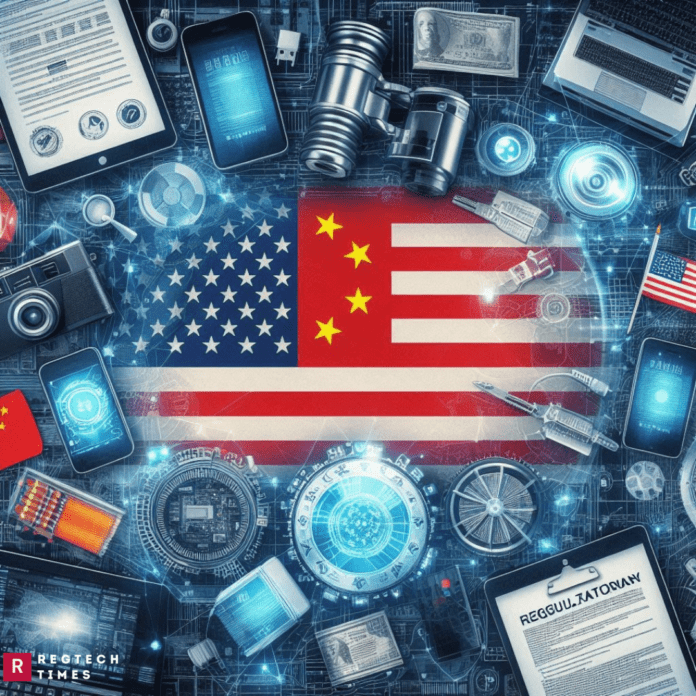In December, a new entity named American Lidar was registered in Michigan, strategically positioned within driving distance of the major U.S. automakers. This move is part of a rebranding strategy by Chinese firms to establish subsidiaries or affiliates under different names to navigate around regulatory and reputational challenges.
Unbeknownst to many, the company behind this new venture is Hesai Group, a China-based lidar manufacturer that has been flagged as a security concern by the U.S. government.
As the Biden administration intensifies its scrutiny and expands its entity lists restricting business dealings with Chinese companies, these firms are adapting by rebranding and creating U.S.-based subsidiaries.
This approach aims to mitigate the impact of Washington’s anti-China policies, say policymakers and national-security experts. Such regulatory evasion tactics also present opportunities for American entrepreneurs who wish to partner with popular Chinese companies despite the geopolitical tensions.
“Chinese firms may encounter setbacks, but they swiftly adjust their business strategies and pursue new directions,” said Derek Scissors, a former commissioner on the U.S.-China Economic and Security Review Commission.
The TikTok Precedent
TikTok, the popular video app owned by ByteDance, spent years distancing itself from its Chinese parent by establishing a U.S. headquarters and exploring rebranding options. Despite these efforts, TikTok faces a potential ban under new U.S. legislation and has filed a lawsuit against the government, alleging First Amendment violations.
The legal measures taken by TikTok highlight a broader trend of Chinese companies attempting to shift production, rebrand as American entities, or establish new subsidiaries with different names. While these actions are legal, they frustrate regulators who find it challenging to enforce laws when the true ownership of companies is obscured.
“As the U.S. government turns to blacklists as a means of identifying problematic Chinese companies and imposing restrictions, the rebranding game is going to intensify,” commented an aide from the House of Representatives researching Chinese companies in the U.S.
Rebranding Tactics and Legal Loopholes
A notable example is the Massachusetts affiliate of Chinese biotech giant BGI Group, which recently rebranded by removing “BGI” from its name. Similarly, SZ DJI Technology, the world’s leading drone maker, partnered with an American startup to sell drones in the U.S., anticipating a possible ban. In the past, Huawei Technologies preemptively established an American subsidiary, Futurewei in a rebranding attempt, before facing U.S. sanctions.
Lidar Controversy
Hesai Group, a prominent lidar manufacturer, found itself embroiled in the U.S.-China tech trade conflict due to allegations that its sensors could collect sensitive American data. Lidar technology is crucial for automotive safety features such as lane-keeping and automatic braking. In January, Hesai established American Lidar as its U.S. manufacturing facility. However, shortly after, the Defense Department designated Hesai as a Chinese military entity, causing its stock to plummet by 30% in one day, with little recovery since. Their rebranding efforts failed.
This designation prevents the U.S. military from purchasing Hesai products, though private companies can continue their dealings. Hesai asserts that its lidars do not pose a threat as they cannot store or transmit images wirelessly. Despite this, the fallout led Hesai to pause plans for the American Lidar facility. Hesai has since sued the Defense Department, seeking removal from the list, arguing no military affiliations or government control.
BGI Genomics, part of BGI Group, faced similar scrutiny and changed its Massachusetts subsidiary’s name from BGI Americas to Innomics. However, a congressional select committee has accused the name change of attempting to evade regulatory oversight, pushing for Innomics to be added to the military-entity list.
A Strategic Shift
National-security experts and lawyers argue that targeting individual Chinese firms encourages rebranding and obfuscation. “Sanctions should target entire technology sectors rather than individual firms,” stated Scissors, advocating for broader policies to effectively address the issue.
Business Opportunities Amid Regulations
The legislative landscape in the U.S. continues to evolve, with new proposals targeting Chinese drone maker DJI. Congress aims to broadly prohibit DJI drones for both consumers and government use, citing data privacy and human rights concerns. DJI refutes these allegations.
For entrepreneurs like Randall Warnas, these regulations present business opportunities. Last year, Warnas struck a deal with DJI to license its technology for at least two drone models, which he plans to sell in the U.S. through his new startup, Anzu Robotics. By assembling the drones in Malaysia and storing data in the U.S., Warnas aims to address concerns about data sharing with Beijing.
“Our entire goal was to meet the United States’ request to prevent Chinese drones from operating in the U.S.,” Warnas explained.
However, some U.S. officials, including Rep. Elise Stefanik (R., N.Y.), view such arrangements as attempts to circumvent sanctions, promising accountability for DJI and its affiliates.
DJI maintains that collaboration requests, including licensing agreements, are common and necessary to continue providing its drones to users globally.
As U.S. scrutiny on Chinese companies intensifies, these firms are increasingly adopting strategies like rebranding and establishing subsidiaries to maintain their foothold in the American market. While legal, these maneuvers complicate regulatory enforcement and raise significant national security concerns. Policymakers and national-security experts continue to debate the most effective approach to addressing these challenges, balancing economic interests with security imperatives.



